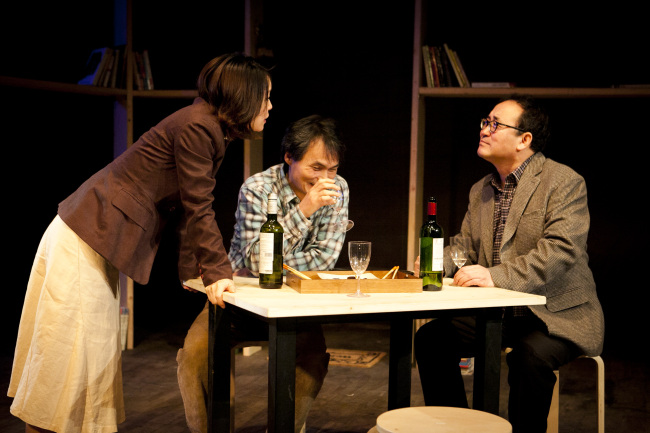How do people react to the waves of change in society?
Theater director Choi Won-seok pondered this question before writing “Metamorphosis” in 2009. Some people ride the tides, while others swim against the current or just evade the turmoil. There is no right or wrong answer. It is only a matter of choice, says the director.
“Byeontae,” a homonym for a pervert, is the play’s title in Korean. The poster, showing half-naked body of an actress, gives an impression that the play is R-rated or contains sexual content. Though all of the above hold true and there is nudity in the show, the two-hour-long play sheds light on a more philosophical, thought-provoking theme.
“Metamorphosis,” which received the grand prize at the recent Seoul Theater Festival Awards, centers on three main characters who experience a profound change in thought and lifestyle in order to adapt to an ever-changing society.
 |
| A scene from “Metamorphosis.” (Hangang Art Company) |
The play is set in a small book rental shop owned by poet Min Hyo-seok (Jang Yong-cheol) and his wife Han So-young (Lee Yoo-jeong), who make a living by teaching creative writing to children. Hyo-seok tries hard to write good poetry but the words don’t come easy to him. He is waiting for his “Eureka!” moment, while teaching poetry to a less educated but rich butcher Oh Dong-tak (Kim Gui-seon) to pay the rent for his faltering shop.
The couple praises Dong-tak’s lively and honest writing approach, but when he is not around, they mock his less sophisticated and rough style of poetry.
Soon after, So-young realizes that it is Dong-tak’s tumultuous life that teaches her the meaning of life, rather than her sheltered and naive husband which she illustrates as a timid alien who stays by his bookshelf all the time.
“People who survive are strong, not the other way around,” says So-young and she decides to sell the book shop, only to realize that the value of their entire book collection is merely 100 won ($0.10) per 1 kilogram of books. That was the value of Hyo-seok’s lofty literary career ― less than the price of meat.
Moreover, Dong-tak’s first-ever written poem, which describes his meat butchering experience, suddenly becomes a best-seller.
Dong-tak’s rising status offers a stark contrast to the couple’s never-ending hardship. In all this, “Metamorphosis” bluntly presents the crumbling lives of highbrow artists and intellectuals who fail to adapt to society and asks two questions: What kind of society do we live in? And who are the artists and the intellectuals in this society?
The play does not give a clear-cut answer, nor does it judge whose metamorphosis was right or wrong. Instead, the audience has to decide for itself, only to realize that everyone contains part of each character.
The director noted that the play was started from his own personal memory of a tiny book rental shop he used to visit often. “Whenever I passed by, I was curious whether the shop would make any profit,” said Choi. “A few years later, I went back and it had become a fried chicken restaurant.”
It was then that he realized that the things he held dearly ― values, passion and love ― are vulnerable and can vanish one day. He also admitted that there were some parts of himself in all the three characters he created.
Lee Yoo-jeong, who played So-young in the play, said the changes she experienced in the play were not like a metamorphosis into a beautiful, colorful butterfly, but resembled that of a cicada, desperate and gruesome, just like reality.
The play “Metamorphosis” runs through Dec. 31 at the Art Space Seoul in Daehangno near Hyehwa Station. Tickets are 15,000 won. For more information, call (02) 3676-3678.
By Ahn Sung-mi (sahn@heraldcorp.com)

